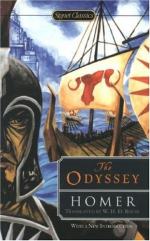So from the sluices of Ulysses’ eyes
Fast fell the tears, and sighs succeeded sighs:
Conceal’d he grieved: the king observed
alone
The silent tear, and heard the secret groan;
Then to the bard aloud: “O cease to sing,
Dumb be thy voice, and mute the tuneful string;
To every note his tears responsive flow,
And his great heart heaves with tumultuous woe;
Thy lay too deeply moves: then cease the lay,
And o’er the banquet every heart be gay:
This social right demands: for him the sails,
Floating in air, invite the impelling gales:
His are the gifts of love: the wise and good
Receive the stranger as a brother’s blood.
“But, friend, discover faithful what I crave;
Artful concealment ill becomes the brave:
Say what thy birth, and what the name you bore,
Imposed by parents in the natal hour?
(For from the natal hour distinctive names,
One common right, the great and lowly claims:)
Say from what city, from what regions toss’d,
And what inhabitants those regions boast?
So shalt thou instant reach the realm assign’d,
In wondrous ships, self-moved, instinct with mind;
No helm secures their course, no pilot guides;
Like man intelligent, they plough the tides,
Conscious of every coast, and every bay,
That lies beneath the sun’s all-seeing ray;
Though clouds and darkness veil the encumber’d
sky,
Fearless through darkness and through clouds they
fly;
Though tempests rage, though rolls the swelling main,
The seas may roll, the tempests rage in vain;
E’en the stern god that o’er the waves
presides,
Safe as they pass, and safe repass the tides,
With fury burns; while careless they convey
Promiscuous every guest to every bay,
These ears have heard my royal sire disclose
A dreadful story, big with future woes;
How Neptune raged, and how, by his command,
Firm rooted in a surge a ship should stand
A monument of wrath; how mound on mound
Should bury these proud towers beneath the ground.
But this the gods may frustrate or fulfil,
As suits the purpose of the Eternal Will.
But say through what waste regions hast thou stray’d
What customs noted, and what coasts survey’d;
Possess’d by wild barbarians fierce in arms,
Or men whose bosom tender pity warms?
Say why the fate of Troy awaked thy cares,
Why heaved thy bosom, and why flowed thy tears?
Just are the ways of Heaven: from Heaven proceed
The woes of man; Heaven doom’d the Greeks to
bleed,
A theme of future song! Say, then, if slain
Some dear-loved brother press’d the Phrygian
plain?
Or bled some friend, who bore a brother’s part,
And claim’d by merit, not by blood, the heart?”
BOOK IX.
THE ADVENTURES OF THE CICONS, LOTOPHAGI AND CYCLOPS
Ulysses begins the relation of his adventures: how, after the destruction of Troy, he with his companions made an incursion on the Cicons, by whom they were repulsed; and, meeting with a storm, were driven to the coast of the Lotophagi. From there they sailed to the land of the Cyclops, whose manners and situation are particularly characterised. The giant Polyphemus and his cave described; the usage Ulysses and his companions met with there; and, lastly, the method and artifice by which he escaped.




